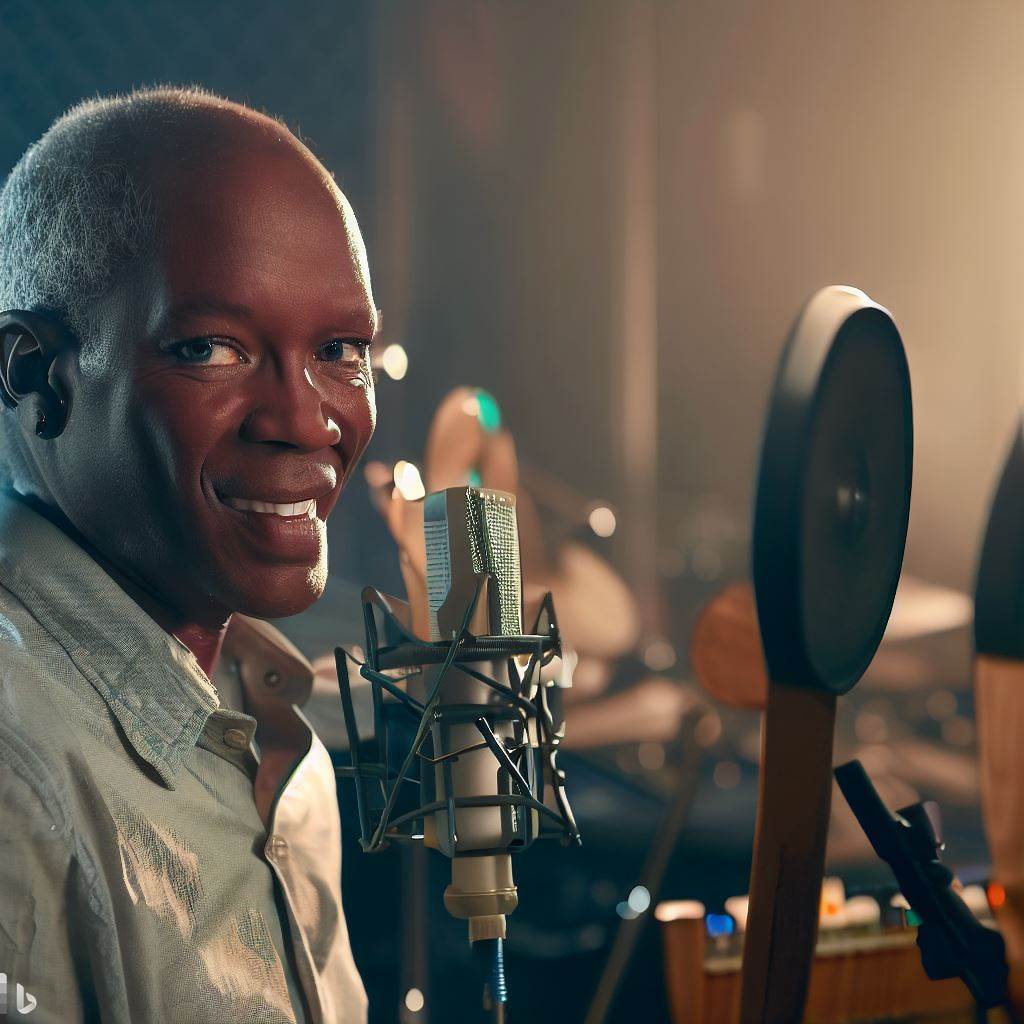Introduction
Celebrating Nigeria Foley Artists: Unsung Heroes of Sound, their skillful craftsmanship brings life to on-screen moments with meticulously created audio effects.
Foley artists, the unsung heroes of sound, are responsible for creating sound effects in films and TV shows. Their role is vital in enhancing the viewing experience for audiences.
Foley artists bring the world of the screen to life by using various everyday objects to recreate sounds. Each footstep, door creak, or glass breaking is meticulously crafted to match the action.
Their work goes beyond simply replicating sounds; it involves capturing the essence and mood of a scene. Foley artists create an emotional connection between the viewers and the on-screen action.
Without the artistry of Foley, films and TV shows would feel hollow and incomplete. Their attention to detail adds a layer of realism that immerses audiences in the story.
Foley artists use their creativity and ingenuity to produce sounds that may not exist in reality. They often experiment with different objects to achieve the desired effect, pushing the boundaries of imagination.
Their contributions are often overlooked, as the work seamlessly blends into the overall audio mix. Audiences rarely recognize the effort and expertise behind every sound effect.
Foley artists deserve recognition for their ability to create a symphony of sounds that enhance the visuals on the screen. Their work is crucial in bringing stories to life and evoking emotions from viewers.
In the end, Foley artists play a crucial role in the film and television industry. Their creative talents and attention to detail elevate the viewing experience, making them unsung heroes of sound.
The History of Foley Art in Nigeria
Foley art in Nigeria has a rich and fascinating history, originating and evolving over the years to become an integral part of the country’s film industry.
The development of this art form can be traced back to the early days of Nigerian cinema.
Origin and development of Foley art in Nigeria
During the 1960s, as Nigeria gained independence, the film industry started to flourish.
Local filmmakers recognized the need for sound effects to enhance their productions, but due to limited resources and technological advancements, they had to find innovative ways to create realistic sounds.
This led to the birth of Foley art in Nigeria. Inspired by the work of international film industries, Nigerian filmmakers began experimenting with creating sound effects in their own unique ways.
They found that by using everyday household items and their creativity, they could mimic sounds that closely resembled real-life actions and environments.
Key milestones and notable individuals who contributed to the growth of Foley art in the country
One of the key milestones in the development of Foley art in Nigeria was the establishment of the Nigerian Film Corporation in 1979.
This government-owned organization provided support for local filmmakers, including resources for sound production.
A notable individual who contributed significantly to the growth of Foley art in Nigeria was James Iroha, popularly known as “Giringori.”
He was a renowned Foley artist and sound engineer who worked on numerous Nigerian films during the 1980s and 1990s. His expertise and dedication paved the way for future Foley artists in the country.
How Nigerian Foley artists bring a unique cultural perspective to their work
Nigerian Foley artists bring a unique cultural perspective to their work. Nigeria is a diverse country with multiple ethnic groups, each with its own distinct sounds and traditions.
Foley artists incorporate these cultural elements into their sound designs, creating a truly immersive experience for the audience.
Read: How to Become a Successful PR Specialist in Nigeria
Challenges Faced by Nigerian Foley Artists
Specific challenges faced by Foley artists in Nigeria compared to their counterparts in other countries
When compared to their counterparts in other countries, Nigerian Foley artists encounter specific challenges that hinder their work and recognition. These challenges include:
- Lack of financial support: Nigerian Foley artists face a constant struggle for funding and financial resources.
- Insufficient equipment: Due to limited resources, Foley artists in Nigeria often lack access to proper equipment and tools.
- Lack of recognition: The work of Foley artists in Nigeria is frequently overlooked, resulting in a lack of acknowledgement and appreciation.
The lack of financial support, proper equipment, and recognition for their work
The absence of financial support poses a significant obstacle for Nigerian Foley artists. Unlike their counterparts in more developed countries, they struggle to secure adequate funding for their projects.
Without financial assistance, it becomes challenging for them to acquire the necessary materials and resources to create high-quality sound effects for films, TV shows, and other productions.
In addition, the scarcity of proper equipment further exacerbates the challenges faced by Nigerian Foley artists.
While their counterparts in other countries may enjoy access to state-of-the-art studios and advanced technology, Nigerian Foley artists often have to make do with limited resources.
They may have to resort to improvisation and creativity to replicate sounds using everyday objects, which can be time-consuming and lead to subpar results.
Perhaps one of the most disheartening aspects for Nigerian Foley artists is the lack of recognition for their valuable contributions.
Despite the important role they play in enhancing the audience’s audio experience, their work often goes unnoticed.
Their efforts are not given the same level of appreciation as those of actors, directors, or other professionals in the entertainment industry.
The resilient and creative nature of Nigerian Foley artists in overcoming these challenges
Nevertheless, Nigerian Foley artists display an impressive level of resilience and creativity in overcoming these challenges.
Despite the financial constraints, they find ways to continue working, driven by their passion for sound design. Instead of being discouraged, they embrace their limitations and develop innovative techniques to create immersive audio effects.
Additionally, Nigerian Foley artists have formed supportive communities and networks to share knowledge and resources.
Through collaboration and cooperation, they are able to overcome the scarcity of equipment and collectively find solutions to enhance the quality of their work.
These artists also actively seek recognition for their craft by participating in local and international film festivals, submitting their work for awards, and leveraging social media platforms to showcase their talent.
By doing so, they hope to increase awareness about Foley art in Nigeria and gain the recognition they rightfully deserve.
Despite the challenges they face, Nigerian Foley artists continue to make significant contributions to the Nigerian film industry.
Their resilience, creativity, and dedication enable them to produce exceptional sound effects that enhance the overall viewing experience.
Celebrating their work and supporting their endeavors is crucial in shining a spotlight on these unsung heroes of sound.
Read: Nigeria’s Animation Industry: Past, Present, Future
Celebrating Nigerian Foley Artists
The Need to Celebrate and Acknowledge the Contributions of Nigerian Foley Artists
It is essential to celebrate and acknowledge the significant contributions made by Nigerian Foley artists in the world of sound production.
These unsung heroes are the backbone of sound design and play a crucial role in enhancing the viewers’ experience in films and TV shows.
Nigerian Foley artists possess immense talent and skill, which often goes unnoticed and unappreciated.
By recognizing their dedication and expertise, we not only honor their hard work but also inspire others to pursue this unique art form.
Moreover, celebrating Foley artists helps raise awareness about the importance of sound design in the Nigerian entertainment industry.
Foley work adds depth and realism to on-screen action, bringing scenes to life and immersing the audience in the storytelling process.
By acknowledging their contributions, we acknowledge the integral part Foley artists play in the creative process, boosting their morale and encouraging them to continue their exceptional work.
The Impact of Nigerian Foley Artists in Films and TV Shows
The work of Nigerian Foley artists has had a profound impact on the quality and authenticity of Nigerian films and TV shows.
Their attention to detail and ability to recreate sounds enhance the overall cinematic experience.
Sound effects produced by Foley artists help create a more immersive and engaging experience for the audience.
From footsteps and door slams to the rustling of leaves and gushing of water, Foley artists painstakingly recreate every sound effect.
Without Foley artists, scenes in Nigerian movies would feel empty and incomplete.
The sound of a character’s footsteps, a car screeching to a halt, or the clink of glasses in a bar are all meticulously crafted sounds by these talented artists.
Through their work, Foley artists add a layer of authenticity to Nigerian films, making them more relatable and believable.
They ensure that every action on screen is accompanied by the appropriate sound, enhancing the audience’s emotional connection to the story.
Success Stories and Recognizing Talented Foley Artists in Nigeria
Nigeria is home to numerous talented Foley artists who have made significant contributions to the entertainment industry.
One such success story is Adeola Adetunji, who has worked on several blockbuster movies and series.
Adetunji’s attention to detail and ability to reproduce sounds accurately have earned her critical acclaim and respect among her peers and the industry as a whole.
She is an inspiration to aspiring Foley artists in Nigeria and beyond. Another remarkable Foley artist is Chinedu Eze, known for his exceptional work on popular TV shows.
He has mastered the art of creating sounds from scratch, ensuring that every scene resonates with the audience on a sensory level.
Recognizing the remarkable work of Foley artists like Adetunji and Eze not only brings them the recognition they deserve but also sets an example for others to follow.
Their dedication and creativity inspire a new generation of Foley artists to push boundaries and explore the possibilities of sound design.
All in all, celebrating and acknowledging the contributions of Nigerian Foley artists is essential to honor their hard work and talent.
Their impact on Nigerian films and TV shows cannot be overstated, as they bring scenes to life and enhance the viewer’s experience.
By recognizing and sharing success stories, we inspire future generations of Foley artists to pursue their passion and continue the rich tradition of sound design in Nigeria.
Read: The Role of Public Relations Specialists in Nigeria Today

Promoting and Supporting Nigerian Foley Artists
Foley artists play a crucial role in the creation of sound effects for films, television shows, and other forms of media. Despite their significant contributions, they often remain unsung heroes in the industry.
Promoting and supporting Nigerian Foley artists is essential for recognizing their talent, preserving their craft, and encouraging the growth of the Nigerian film industry.
This section will discuss the importance of promoting and supporting Foley artists in Nigeria, explore potential solutions for doing so, and encourage audiences to appreciate their work and support their projects.
The importance of promoting and supporting Foley artists in Nigeria
Promoting and supporting Foley artists in Nigeria is of utmost importance for several reasons.
First and foremost, Foley artists possess a unique skill set that enhances the auditory experience of films and television shows.
They use everyday objects to create natural and realistic sounds that help bring scenes to life.
By recognizing and supporting their talent, we ensure that their craft continues to thrive and contribute to the overall quality of Nigerian productions.
Potential solutions
Furthermore, promoting and supporting Foley artists provides them with the recognition and resources they need to further develop their skills.
Government funding can play a crucial role in this aspect. Allocating funds specifically for Foley artistry would enable artists to access high-quality equipment, attend training programs, and collaborate with international artists.
Such initiatives would empower Foley artists to push boundaries and elevate the standards of Nigerian films.
Training programs also hold great potential for promoting and supporting Foley artists in Nigeria.
These programs would not only nurture talent but also create a platform for aspiring artists to learn from experienced professionals.
By providing formal education and mentorship opportunities, we can ensure that the art of Foley continues to be passed down to future generations.
Collaborations with international artists present yet another avenue for supporting Nigerian Foley artists.
By working with renowned Foley artists from around the world, Nigerian artists can gain exposure to different techniques, approaches, and perspectives.
Such collaborations can lead to innovative sound designs and open doors to international recognition for both individual artists and the Nigerian film industry as a whole.
Encouraging audiences to appreciate the work of Foley artists and support their projects
It is crucial for audiences to appreciate and support the work of Foley artists. Without their contribution, films and television shows would lack realism and immerse viewers less effectively.
Engaging with the work of Foley artists can enhance the audience’s understanding and appreciation of the technical aspects involved in filmmaking.
Additionally, supporting their projects financially or by spreading the word about their work through social media can make a significant difference in promoting their talent.
To sum it up, promoting and supporting Nigerian Foley artists is vital for the growth and recognition of this unique art form.
Publish Your Professional Profile, Business or Brand
Showcase your expertise, gain trust, and boost visibility instantly on Professions.ng.
Publish NowGovernment funding, training programs, and collaborations with international artists all offer potential solutions to nurture and elevate the talents of Foley artists in Nigeria.
By encouraging audiences to appreciate their work and actively support their projects, we can help create an environment that values and celebrates the unsung heroes of sound.
Read: Building a Foley Studio in Nigeria: Costs and Considerations
Conclusion
Foley artists play a critical role in Nigerian filmmaking and sound production. Their ability to create realistic sound effects enhances the overall viewing experience for audiences.
Despite their significant contributions, they often go unrecognized and unsupported.
It is vital for the Nigerian film industry and the public to acknowledge and appreciate the work of Foley artists.
By giving them the recognition they deserve, we not only value their talent but also encourage their growth and development within the industry.
Supporting and celebrating Nigerian Foley artists can lead to improved sound production in films, creating a more immersive and engaging cinematic experience.
Furthermore, it can inspire aspiring artists to pursue a career in Foley art and contribute to the growth of the industry as a whole.
To contribute to the growth of Foley art in Nigeria, we should spread awareness of its importance among our peers, colleagues, and social networks.
By sharing information about the work of Foley artists and their contributions, we can generate greater interest and support for their craft.
Additionally, it is essential to provide resources and opportunities for Foley artists to improve their skills and collaborate with other industry professionals.
This can be achieved by organizing workshops, training programs, and networking events specifically tailored to their needs.
Let us celebrate and support the unsung heroes of sound in Nigeria – the Foley artists.
Through recognition and advocacy, we can ensure their continued contributions to Nigerian filmmaking and sound production, as well as inspire future generations to embrace this integral aspect of the industry.




